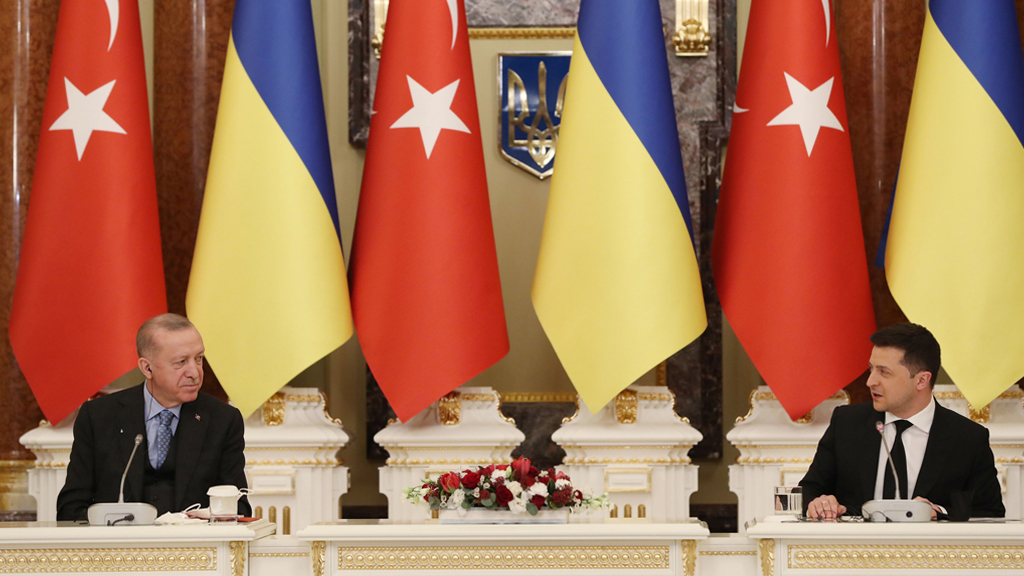« The war with Russia has forced Kyiv to take a more realistic view of Turkish foreign policy. Ukraine no longer views its relationship with Turkey as part of its partnership with the West » reports Iliya Kusa in Carnegie Endowment.
Since the start of Russia’s invasion of Ukraine, Turkey has remained the friendliest of all the NATO countries toward Moscow. It has not imposed sanctions or cancelled flights between the two countries, and has continued to cooperate closely with Moscow on many issues. This could hardly fail to raise questions in Ukraine, which had in recent years come to see Ankara as an important partner.
In the five years preceding the war, Turkish-Ukrainian relations went from strength to strength. Ankara saw its partnership with Kyiv as contributing to President Recep Tayyip Erdogan’s goal of turning Turkey into an influential regional power, and a chance to build on its economic and political ties with Ukraine to strengthen its positions in the Black Sea basin.
For Ukraine, Turkey was one of few partners prepared to cooperate seriously in the defense industry: something that has been of critical importance for Kyiv since 2014. Following Russia’s occupation of Crimea and part of the Donbas region that year, Kyiv set on a trajectory of fully modernizing its armed forces for the first time since gaining independence in 1991. Turkey was seen as a vital partner willing to sell advanced drones, and help Ukraine build its first modern corvette that was inaugurated on October 2. Ankara was also keen to deepen defense ties with Kyiv since it was interested in securing Ukrainian engines for its drones.
It’s also important that Turkey has close ties to the Crimean Tatar community, a Turkic ethnic group, making it a natural ally for Ukraine over the Russian annexation of Crimea. Ankara may not have joined in with all the international sanctions imposed against Russia in 2014, but it has supported Kyiv in keeping Crimea on the international agenda by helping to set up the Crimea Platform diplomatic initiative, and has also assisted in the release of Crimean Tatar political prisoners.
Still, neither side viewed the other as a long-term strategic partner or military and political ally. The relationship was built upon ad hoc and selective cooperation, such as in the manufacturing of combat drones, construction of transport infrastructure, grain trade, solidarity over Crimea, and Black Sea shipping security issues.
For Ankara, Russia was always of greater economic and security value as a partner than Ukraine was. In pursuing its national interests, Turkey was prepared to ignore not only Kyiv’s but also its Western allies’ opinion, such as when it signed up to Russia’s TurkStream pipeline project to bypass Ukrainian territory in delivering Russian gas to Europe. It also purchased S-400 missile systems from Moscow, despite criticism from the United States and NATO.
Now Ankara is trying to use the Russian invasion to further increase its regional and global influence by assuming the role of mediator. That would strengthen Turkey’s reputation and influence in the region, and allow it to lay claim to the role of chief mediator between Russia and the West at a time when the ties between them are unraveling.
The grain deal signed in Istanbul has set a precedent. Russia is prepared to make minor compromises in exchange for sanctions being eased, and seemingly has no objections to Erdogan in the role of mediator. Judging by the grain deal, Ukraine is not opposed to Turkish mediation either.
However, the war has taken a toll on Ankara’s public image in Ukraine. Having gotten used to Turkey being described as a “strategic ally,” a strong and reliable partner, and an increasingly close friend to Ukraine, the Ukrainian public was unsurprisingly disappointed when Ankara failed to join in with anti-Russia sanctions following the invasion, blocked Sweden and Finland’s accession to NATO, and started talks with Moscow about trading in national currencies.
Anger at Turkey is also noticeable at the political level. The Ukrainian ambassador to Turkey has said openly that Ankara is complicit in the theft of Ukrainian grain by Moscow. The Ukrainian Foreign Ministry has twice summoned the Turkish ambassador to lodge a protest: first over the release of a Russian vessel carrying Ukrainian grain that had been detained, and then over allegations that Russian S-300 missile systems had been moved from Syria into Ukraine via Turkey. Previously, it would have been hard to imagine such public confrontations.
As a result, Ukraine has stopped seeing its relationship with Turkey as part of its partnership with the West. In a way, this is what Erdogan had long been trying to achieve: to become more self-sufficient on the global stage, and stand between the West and the non-Western world. For a long time, Ukraine either did not notice or simply chose to ignore those intricacies: Turkey is, after all, a NATO member. Now the Russian invasion has forced Kyiv to take a more realistic view of Turkish foreign policy.
This is not to say that a rupture in relations between the two countries is in the cards. Ukraine and Turkey will remain partners, but it will be a more ad hoc and pragmatic partnership than ever. Both the Ukrainian government and public will always question Turkey’s positions and its reliability as an ally, and Ukraine’s growing dependence on the EU and United States may exacerbate that trend, especially if Turkey continues to drift away from the West. The no less ad hoc partnership between Turkey and Russia will limit the development of Ukrainian-Turkish relations.
Still, for the foreseeable future, Turkey will remain an indispensable intermediary in the Ukraine–Russia–West triangle—simply because no one else managed to play this nearly hopeless role more successfully and produce any deliverables.
Carnegie Endowment, October 7, 2022, Iliya Kusa

